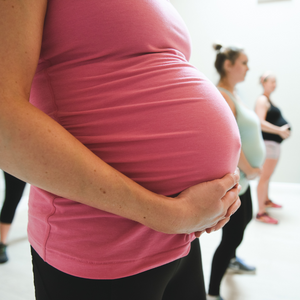
10 Things Women Need While They Are Pregnant (Beyond Their Registry)
FIT4MOM x Jessica Maurer x Tot Squad
If you're pregnant, you've probably spent hours comparing strollers and bassinets, but most of what a new mom really needs can’t be added to a registry. True preparation for motherhood isn’t about baby gear. It’s about finding strength, connection, and calm as you grow into your new role.
Here are 10 things every mom-to-be actually needs before Baby arrives — no registry required.
1. A Village (Not Just Visitors)
They say it takes a village to raise a child. It also takes one to raise a mom. You need people who understand sleepless nights, shifting identities, and those in-between moments that no one talks about.
That’s what FIT4MOM is built for: a space for movement and motherhood, where connection happens between lunges, Stroller Strides, and shared stories. From pregnancy through postpartum and beyond, this is your village.
2. Real Rest (Not Just Sleep)
Growing a human is full-time work. Rest now means more than hours under the covers. It’s permission to pause, breathe, and do less.
Create a bedtime ritual that helps you wind down: a warm shower, gentle stretches, or a guided prenatal meditation. Even when you can’t sleep, stillness is its own kind of recovery.
Try one of our guided meditations, specifically designed for expecting mothers.
3. Movement That Feels Good
Prenatal fitness isn’t about doing more...it’s about moving smart. Safe exercise during pregnancy strengthens your core and pelvic floor, eases aches, and preps your body for birth and recovery.
FIT4BABY® and FIT4MOM On Demand workouts offer trimester-specific guidance from certified prenatal and postnatal instructors so that you can move confidently through every stage.
4. Support You Can Count On
Every mom deserves trusted support — not another overwhelming Google search at 2 a.m.
That’s where Tot Squad comes in. It’s an online platform that connects parents with certified professionals for a range of services, including car seat safety, lactation consulting, sleep coaching, and postpartum care.
We’re proud that FIT4MOM On Demand is now listed as a service within Tot Squad, giving moms easy access to safe, expert-led workouts alongside other essential wellness resources.
5. Nourishment That Fuels You — Not Just the Baby
The best “diet” for pregnancy is one that keeps you strong, satisfied, and steady. Think whole foods, colorful veggies, and plenty of water to support both your energy and your baby’s growth.
If that feels like one more thing to manage, don’t overthink it — small, consistent choices make the biggest difference.
For guidance that’s realistic and easy to follow, check out the FIT4MOM Prenatal Nutrition Guide. It breaks down what to eat during each trimester, how to navigate cravings, and how to nourish yourself for strength and recovery.
And remember, you don’t have to figure it all out alone. Lean on support systems (and services like Tot Squad) that connect you with trusted nutrition and wellness experts to make healthy living feel simple again.
6. A Calm Mind (Even for Five Minutes)
Pregnancy can bring a swirl of emotions. Grounding yourself with breathwork, mindfulness, or gentle movement helps you manage stress and anxiety while staying present.
Each FIT4BABY class ends with meditation — because your mental health deserves just as much care as your physical health.
7. Informed Confidence (Your Birth, Your Way)
When you understand your options, you can advocate for yourself with calm and clarity. Childbirth education isn’t about predicting every moment. It’s about preparing your mind and body to move through the process with confidence.
Start with trusted sources:
Talk with your healthcare provider about prenatal classes offered through your hospital or birth center.
Explore virtual childbirth education, such as classes on Tot Squad, which connects you with certified birth and postpartum experts who can guide you through everything from labor prep to newborn care.
Learn how movement supports your delivery and recovery with FIT4BABY® and FIT4MOM On Demand classes — built by prenatal and postnatal fitness specialists to help you strengthen your body for birth and beyond.
Read reputable resources like the American College of Obstetricians and Gynecologists (ACOG) website for science-backed insights.
The more informed you are, the more empowered you’ll feel to make choices that reflect your needs, values, and voice.

8. A Postpartum Game Plan
The “fourth trimester” is real — and it’s just as important as the first.
Line up your support before the baby arrives: nutritious meals, emotional check-ins, and physical recovery tools. Advocate for yourself and listen to your body. Healing takes time.
Both FIT4MOM and Tot Squad offer postpartum resources designed to help you rebuild strength, restore balance, and care for yourself while caring for your baby.
9. Clothes That Move With You
Your changing body deserves comfort and support. Choose breathable, stretchy pieces that make movement — and lounging — easy.
When you feel comfortable, confidence naturally follows.
10. Grace — The Thing You Can’t Buy
Pregnancy is a practice in surrender. Give yourself grace when things don’t go according to plan. Rest when you need it. Laugh when you can. Trust that you’re doing enough, because you are.
The best gifts for motherhood don’t come wrapped in ribbons. They come through connection, confidence, and care.
Between FIT4MOM’s prenatal fitness programs and the expert-backed resources on Tot Squad, you have everything you need to move, grow, and thrive through every stage of motherhood.
NEED MORE IDEAS
Check out these resources.








